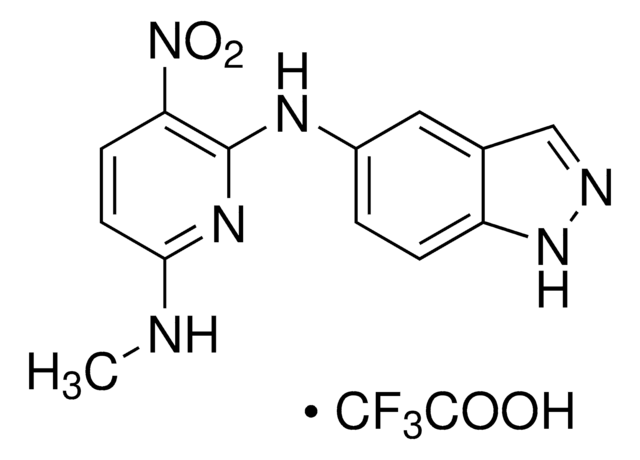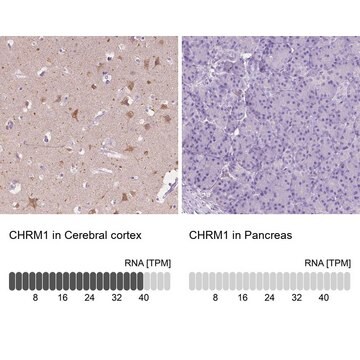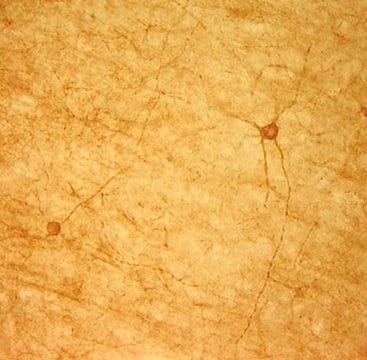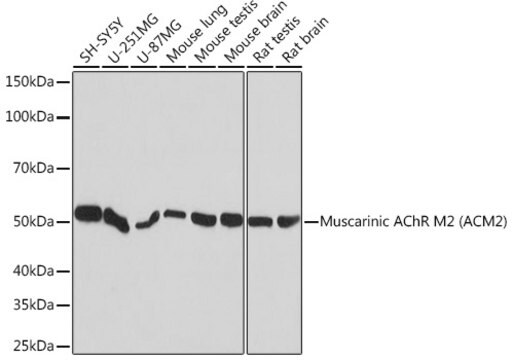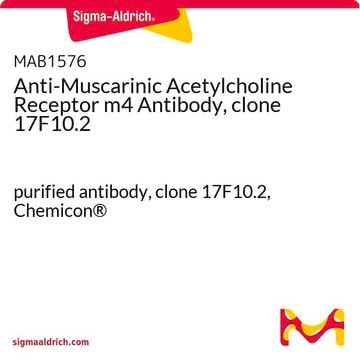AB5164
Anti-Muscarinic Acetylcholine Receptor m1 Antibody
Chemicon®, from rabbit
About This Item
Produits recommandés
Source biologique
rabbit
Niveau de qualité
Forme d'anticorps
affinity purified immunoglobulin
Type de produit anticorps
primary antibodies
Clone
polyclonal
Produit purifié par
affinity chromatography
Espèces réactives
rat, mouse
Fabricant/nom de marque
Chemicon®
Technique(s)
immunohistochemistry: suitable
western blot: suitable
Numéro d'accès NCBI
Numéro d'accès UniProt
Conditions d'expédition
wet ice
Modification post-traductionnelle de la cible
unmodified
Informations sur le gène
human ... CHRM1(1128)
Spécificité
Immunogène
Application
Neuroscience
Neurotransmitters & Receptors
Dilutions should be made using a carrier protein such as BSA (1-3%)
Immunohistochemistry: rat frozen sections. 1:50-1:200, internal epitope; use triton X-100 in blocking buffer only; dilute primary antibody in PBS or TBS with 0.5%-1% BSA or NGS only.
Optimal working dilutions must be determined by the end user.
Forme physique
Stockage et stabilité
Remarque sur l'analyse
Included free of charge with the antibody is 60 μg of control fusion protein (lyophilized powder). The stock solution of the fusion protein can be made up using 100 μL of PBS. For positive control, in Western blot using 10 ng of protein per minigel lane. For negative control, preincubate 3 μg of fusion protein with 1 μg of antibody for one hour at room temperature. Optimal concentrations must be determined by the end user.
Autres remarques
Informations légales
Clause de non-responsabilité
Vous ne trouvez pas le bon produit ?
Essayez notre Outil de sélection de produits.
Mentions de danger
Conseils de prudence
Classification des risques
Aquatic Chronic 3
Code de la classe de stockage
11 - Combustible Solids
Classe de danger pour l'eau (WGK)
WGK 3
Certificats d'analyse (COA)
Recherchez un Certificats d'analyse (COA) en saisissant le numéro de lot du produit. Les numéros de lot figurent sur l'étiquette du produit après les mots "Lot" ou "Batch".
Déjà en possession de ce produit ?
Retrouvez la documentation relative aux produits que vous avez récemment achetés dans la Bibliothèque de documents.
Notre équipe de scientifiques dispose d'une expérience dans tous les secteurs de la recherche, notamment en sciences de la vie, science des matériaux, synthèse chimique, chromatographie, analyse et dans de nombreux autres domaines..
Contacter notre Service technique

